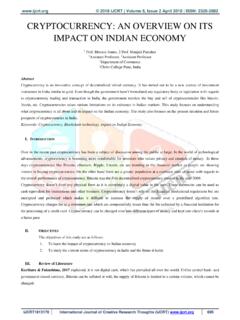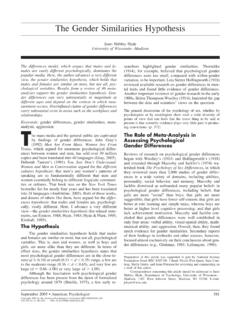Transcription of SCHUMPETER’S INNOVATION THEORY OF
1 2018 IJCRT | Volume 6, Issue 1 January 2018 | ISSN: 2320-2882 IJCRT1705239 International Journal of Creative Research Thoughts (IJCRT) 1678 A CRITICAL STUDY OF JOSEPH A. SCHUMPETER S INNOVATION THEORY OF ENTREPRENEURSHIP 1Dr. C Shekhar Upadhyay. 2Dr. Priyanka Rawal. 1&2 Assistant Professor, Jagran Lakecity Business School. Jagran Lakecity University, Bhopal. ABSTRACT Entrepreneurship has become the backbone of any growing economy of the world, countries like India has much to offer and receive from this growth saga which is a fine synthesis of risk bearing and INNOVATION in product offerings and services being catered to the market. India particularly has witnessed the growth in start ups in last 10 years which a compelling sign of entrepreneurial traits of country is on the upward trajectory.
2 The growth saga is going to be the sum results or outcome of joint efforts from individual and system both. Today s nations of different level of development are mulling over the very seed of entrepreneurship and the basic mindset of those who might become an entrepreneurs. It is a topic of much debate and conversations all around the globe that, what are those parameters which serve as the milestone or cornerstone when it comes to encouraging entrepreneurship/entrepreneurs from the country. To add fuel into the fire, experts on entrepreneurship have proposed different approaches towards entrepreneurship. These approaches have been proposed by classical and modern experts of entrepreneurship alike. These approaches are collectively referred as Theories of entrepreneurship. These theories are an insightful attempt to rationalize and demystify the enigma of entrepreneurship development.
3 One of the most prominent theorists among modern thinker is Joseph A Schumpeter; he is the one who practically and systematically both equated entrepreneurs with INNOVATION . He is the one who made the clear distinction between who entrepreneurs should be and why he must be called innovator. The present paper is an attempt to further inquire and decode the vary dimensions of Schumpeter s THEORY and also to put the THEORY in present mold of market and economic conditions. This paper shall also encompass the logical and rational criticism of the THEORY of INNOVATION . Key word- INNOVATION , Entrepreneurs, Innovators, Entrepreneurship, Creativity. 2018 IJCRT | Volume 6, Issue 1 January 2018 | ISSN: 2320-2882 IJCRT1705239 International Journal of Creative Research Thoughts (IJCRT) 1679 Entrepreneurship and INNOVATION have become a term which is used interchangeably these days.
4 Now, an entrepreneur has to be innovator before he assumes any other role (Managerial or operational). In a way, INNOVATION and innovativeness and its quantum has become the real parameters of being an entrepreneur. This thought was almost absent from the historical or classical approaches/views/theories of entrepreneurship. The classical approach sees entrepreneurs as more inclined towards organizers cum managers of factors of production and doing things for his owner. This approach was prevalent in most of the last 1800s and early 1900s. The early experts like Richard Cantillon, JB Say, Mills, Adam Smith share almost the same views. In a way entrepreneurs are perceived as an organic extension of traditional businessmen. The entire understanding of entrepreneurs was established firmly, but the soul of entrepreneurs was missing as what actually means to be an entrepreneur.
5 One political economist from Austria who later on became the professor of business at Harvard University USA was quite successful in catching the essence of entrepreneurship in a single word INNOVATION this path breaker and visionary was Joseph Alois Schumpeter (1883-1950). The THEORY which he proposed later became the epitome of further studies on entrepreneurship. Schumpeter s innovative model as it later on popularized as has for the first time equated entrepreneurs to innovators and went on professing the contribution of innovative mindset of entrepreneurs. Where the classical experts where more focused on the traditional attributes in entrepreneurs, Schumpeter has shown the extremely different aspect of entrepreneurs which was never imagined before. The THEORY initially came in year 1949 and till date stands uncontested as no THEORY has been, literally unchallenged.
6 II. RESEARCH METHODOLOGY- The research methodology for the present paper is a mixture of empirical and descriptive methods of research. The idea is to critical judge this THEORY on the criteria of present day market/economic dynamics with special reference to developing nations like India where the opportunities in traditional business models have been shrinking. The present paper is based on qualitative research as data collection and evaluation of data shall be averted keeping in mind the very nature of research purpose. Although, the necessary information and other relevant data has been derived from various sources to make the argument for the THEORY and against. Some of the literature review has been added to make the work more contemporary. The sources of information for the research work is as following- 1.
7 Various published reports on startups and entrepreneurship by government and other organizations 2. Various research papers on entrepreneurship and start ups 3. Studies on various aspects of entrepreneurship and its correlation with INNOVATION 4. Any other information available on the related to topic of the research 5. Experts comments and news articles related to INNOVATION and its role in entrepreneurial development. 2018 IJCRT | Volume 6, Issue 1 January 2018 | ISSN: 2320-2882 IJCRT1705239 International Journal of Creative Research Thoughts (IJCRT) 1680 OF STUDY- The objectives of any study makes it more interesting and up to the point, as these objectives functions as the aspired results as well. The present study also has various objectives which in during the study should evolve and aptly meet as well.
8 The study has the following objectives- 1. To study and understand the THEORY of INNOVATION by Joseph A Schumpeter. 2. To draw the applicability of THEORY in India as well as similar context. 3. To analyze various takeaways from the THEORY of INNOVATION 4. To critically evaluate the THEORY of INNOVATION . REVIEW- Various authors and exporters have spoken on the topic of INNOVATION and its varuosu dimensions, they all have agreed on its various implications as well. Kenneth Michael Kjos (2013) in his study indicate that technology has a minor effect on service INNOVATION regardless of developmental stage. People, customer experiences, value, ideology of management and/or entrepreneurs and management support for learning from failure have a major effect on service INNOVATION regardless of developmental stage. It becomes very clear that failure in INNOVATION has a huge impact upon INNOVATION which is coming in near future.
9 Pontus Braunerhjelm (2010) has found that, the micro economic origin of growth and the macroeconomic outcome is still too rudimentary model led to grasp the full width of these complex and intersecting forces Growth can basically be attributed the following fundamental forces: an increase in factors of production improvements in the efficiency of allocation across economic activities, knowledge and the rate of INNOVATION . Given full employment and efficient allocation, growth is thus driven by knowledge accumulation and INNOVATION . In his views the growth beyond a particular point has to be contributed to rate of INNOVATION and newer product/process inventions. Sanjay Manocha (2012) underlines the relationship between INNOVATION and entrepreneurship as Entrepreneurship can be viewed as a creative and innovative response to the environment and an ability to recognize, initiate and exploit an economic opportunity.
10 According to him an entrepreneur is an innovator who introduces something new in an economy. Entrepreneurship is doing things that are generally not done in the ordinary course of business. He has defined INNOVATION also as INNOVATION may be in; introducing a new manufacturing process that has not yet been tested and commercially exploited, introduction of a new product with which the customers are not familiar or introducing a new quality in an existing product, locating a new source of raw material or semi finished product that was not exploited earlier, opening a new market, hitherto unexploited, where the company products were not sold earlier, developing a new combination of means of production. A traditional businessman working in a routine manner is not entrepreneurial.












